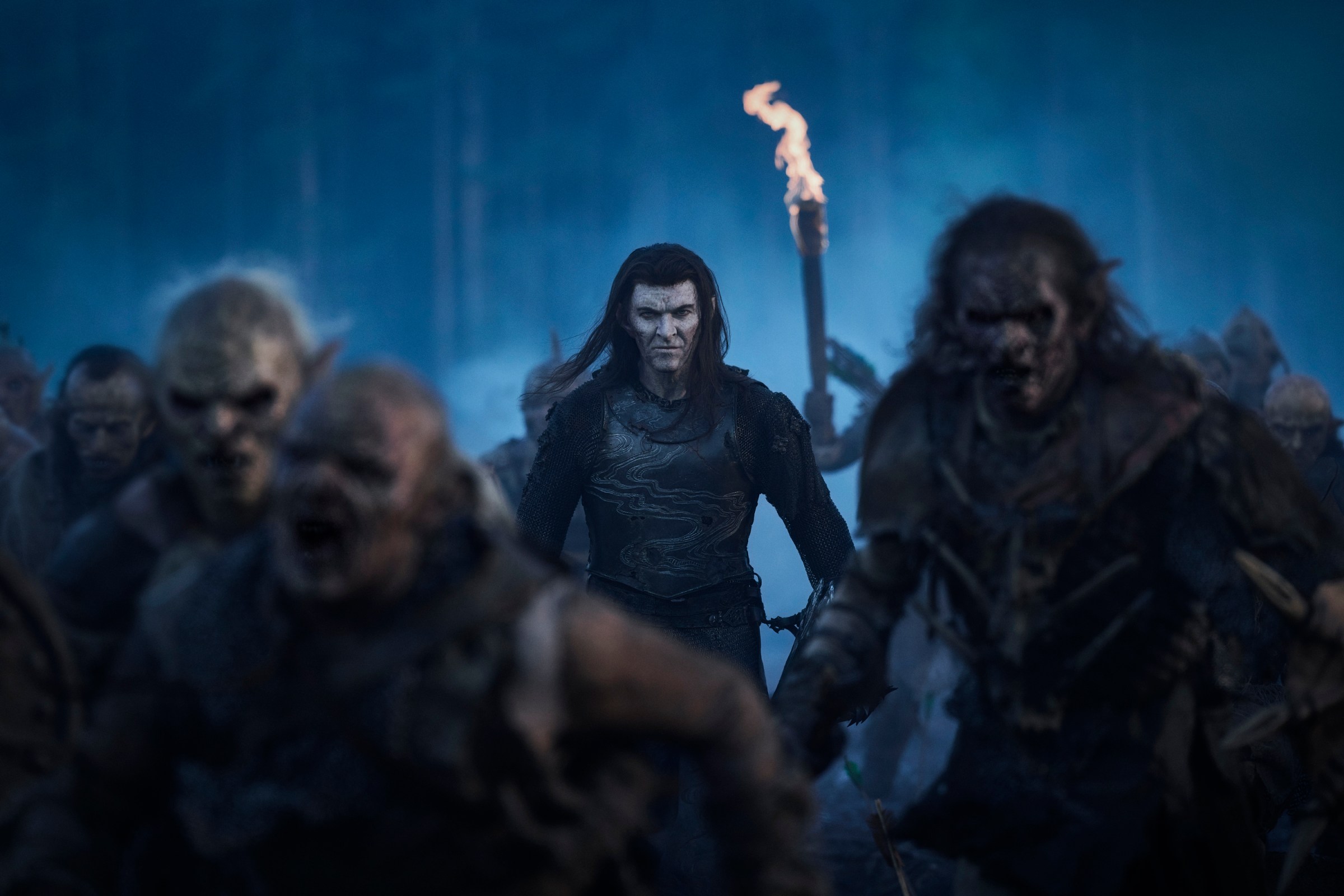Galadriel’s great orc battles have an unexpected weight, considering the orc babies at home
(Editorial note: This post contains spoilers for the ending of The Rings of Power season 2 episode 4.)
Galadriel (Morfydd Clark) can stir things up when she wants to. The Rings of Power‘s climactic final battle in episode 4, where she takes on a few dozen orcs by herself. You might be wondering: if she can kick, shoot, stab, and generally defeat so many uruk by herself, why wouldn’t her entire party of five stay and fight her?
You might agree with Elrond, who nearly spits when he says that she has only stepped forward to ensure that her precious ring of power is brought to safety. I will allow that! Rings do strange things to people in Middle-earth. The better question—I think, anyway—is: How many of those nice orcs had families? And perhaps more importantly, did Rings of Power ever got to the point where you cared?
The series has seemingly paid a lot of lip service to the humanity (to borrow a phrase) of the orcs, largely through its portrayal of Adar. In the first season, Adar stood up to Galadriel’s condemnation of him and his uruk, arguing that what they wanted was the same as hers: a world without Sauron or Morgoth. Adar believes he killed Sauron after his mistreatment of the orcs, something we see him do in the Season 2 opener. Later in the premiere episodes, Adar comforts an orc with a child, reassuring them to remain hopeful, even with rumors of Sauron’s return.
The sizing of orcs is one of many things that “sums up the whole show,” co-showrunner Patrick McKay said during a press conference in August. “The idea that orcs were bound to[Sauron’s]will when he had the ring, it hints that maybe they were something other than that. And that’s tantalizing, and seasons of television can grow out of that gap.”
So far the drama of The Rings of Power nods to those ideas, but never really considers them. See: Galadriel cutting through a horde of orcs with reckless abandon in a triumph for the elves. Those orcs have families! Lives! Dreams of a future where they don’t have to fight, but can instead go home and do orc business in peace! Rings of Powerrepeatedly treats them like cannon fodder.
There is certainly a debate to be had about whether orcs were in fact corrupted, as McKay says, or whether Tolkien intended them to be purely monstrous beasts (or even: if the author intended them to be the former, and in his major works only wrote them as the latter). But that is a debate for people who care more about it about the reproduction of orcs than IIn my opinion, the problem is ultimately quite simple: the series doesn’t take enough account of the needs of this storyline.
It’s no different than the problem Star Wars has faced over the years. While the stormtroopers started out as faceless villains who could easily be deployed to demonstrate both the might of the Empire and our heroes’ ability to defeat it, the faceless foot soldiers became lovable clones, and then in the sequel trilogy, child soldiers who may have felt conflicted about serving the Dark Side. That’s a lot to pile on what should be disposable nuisance characters! And while deepening the lore around them can add a lot of nice worldbuilding, it can also complicate their function in a story.
Just like Star Wars, Rings of Power has a large ensemble cast and a sprawling universe (both old and new) to build upon. And while the show stays fairly clear about who the villains of the story are, the orcs — and all the odd gray matter of their story in what are largely black-and-white heroics — get lost.
Now that Galadriel is at Adar’s mercy, there’s a small chance that orcs might get a little more fair treatment. As Sam Hazeldine, who plays Adar in season 2, told us, this is an elf who “has to believe that uruk aren’t just incorrigibly evil.”
“They’re sentient beings and therefore shouldn’t be treated as if their lives are worthless,” Hazeldine said. “That’s how other characters have treated them so far — Sauron, the Elves, look at them with horror and disgust.
“That is a great injustice, as far as life is concerned, as far as Adar is concerned.”
It’s something Morfydd Clark isn’t sure Galadriel fully understands. “I think Galadriel isn’t sure about the answer (to the orcs’ ability to do good),” Clark said. She notes that much of where the elves are now is a story of “living with consequences” and recognizing their place in the patterns of the world. “The elves have shaped Middle-earth in a way that they’re responsible for everything that’s happened. And should that spread to the orcs? I don’t know.”
There is an added difficulty to all this locking in: we know that by the time the Third Age begins, Lord of the Rings As we know it, the orcs are already corrupted by Sauron, ready to fight, and die, and put meat back on the menu, guys. The way Rings of Power is set up, this should feel like a great downfall, a force for possible good succumbing to the worst of what people believed about them. It should condemn not only the orcs, but also the elves who pushed them away as monsters. But time is running out, both in Middle-earth and in Rings of Power to make the orcs more than an ominous horde. It’s high time we give the uruk their just deserts – we have orc babies to consider, after all.

